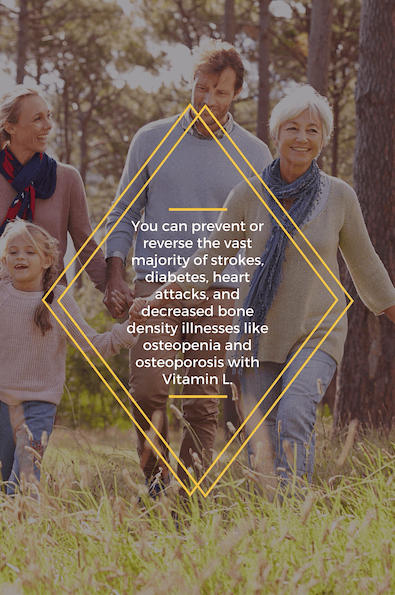The Science Behind Vitamin L | The 5 Best Lifestyle Choices For Anti-Aging | FAQs
“The Fountain of Youth Discovered!”
Every week, you see a new headline that grabs your attention. Someone discovered a new vitamin, an amazing food, or a new exercise gimmick. They promise it will reverse the hands of time, giving you back your youth.
These “magic answers” usually turn out to be illusions. (It is pretty unlikely science will discover one simple answer for anti-aging.)
But maybe your answer lies not in a single pill or vitamin, but in a multi-faceted plan to alter your lifestyle – Vitamin L – that can be the secret sauce of regaining (and maintaining) a healthy and active life well into your 90’s!
For years, science looked at how lifestyle can influence your health. The findings are startling – or maybe just common sense.
The Science Behind Vitamin L
OK… here I go again… talking about “science.” It’s my fall-back position: when in doubt, refer to the tons of studies that prove how important these things are to you and your health!
- In 2001, the Harvard School of Public Health reported a study of 84,941 healthy female nurses who were free of heart disease, cancer and diabetes.
They defined a “low-risk lifestyle” as a body mass index of less than 25, a diet high in fiber and polyunsaturated fat, low in trans fat and glycemic load. This lifestyle also included regular moderate to vigorous exercise (at least 30 minutes a day), no smoking, and drinking no more than one-half alcoholic drink every day.
A follow up found that the women who followed the healthy lifestyle had a 91% lower chance of developing diabetes compared with the other members of the study.
- In 2004, the INTERHEART study group evaluated the factors predicting heart attacks in 52 countries.

The study looked at 15,000 cases of heart attacks. Researchers found nine risk factors which accounted for 90% to 95% of the cases of heart attacks:
- Smoking
- Elevated bad cholesterol to good cholesterol ratio
- High blood pressure
- Diabetes
- Abdominal obesity (waist over 35 inches women and 40 inches for men)
- Stress
- Low intake of fruits and vegetables
- Alcohol intake
- Lack of physical exercise
Lifestyle changes can do away with all nine risks for heart attack.
- In 2006, researchers analyzed data from 43,000 men in the Health Professionals Study between the ages of 40 and 75 with no heart disease.
Low-risk men:
- Had a BMI under 25
- Were nonsmokers
- Were physically active for more than 30 minutes a day
- Used alcohol in moderation
- Ate a diet comprised of more than 40% healthy plants
Men with five out of five low-risk characteristics had an 87% lower rate of heart attack.
- In 2007, Swedish investigators studied more than 24,000 postmenopausal women who had no evidence of heart disease.
They defined “low-risk” as:
- A diet with high scores for fruits and vegetable intake
- Lots of whole grains, legumes, fish
- Moderate alcohol consumption
- Non-smokers
- Who walked or biked 40 minutes a day
- And maintained a trim waist-to-hip ratio
These women enjoyed a reduced risk of heart attacks of 92%.
- In 2013, researchers in the Netherlands studied almost 18,000 men and women without heart disease.
They found that if people followed four steps they were able to lower their risk of heart attacks by 67%:
- Average 30 minutes a day of physical activity
- Eat a healthy diet in the Mediterranean style rich in fruits, vegetables and whole grains
- No smoking
- Enjoy more than one alcoholic beverage a month
People who added a fifth health habit — getting an average of seven or more hours of sleep every night — lowered their risk of heart attacks by 83%.
You can prevent or reverse the vast majority of strokes, diabetes, heart attacks, and decreased bone density illnesses like osteopenia and osteoporosis with Vitamin L.
It’s so simple and available to everyone.

The 5 Best Lifestyle Choices You Can Make For Anti-Aging
#1 Exercise, Exercise and Exercise
In May 2014, researchers revealed their findings on an amazing study. It was the longest-running clinical trial that looked at the connection between physical activity and aging.(1)
They discovered that exercise is one of the best ways to prevent the loss of mobility that often goes with old age.
But how does exercise keep you young?
Exercise builds bone mass!
That is a good thing for you if you do not want to break a hip or wrist (or any other bones) in a simple fall due to decreased bone density!
Exercise also makes your heart more efficient. Keep moving and your heart rate goes up and you circulate more oxygen.
Plus… exercise increases blood flow. That helps your brain release more serotonin.(2) That keeps depression away.
#2 Get Enough Sleep
Is there a connection between sleep and thinking? YOU BET!
Studies show a definite link.(3)
Recent research also found that lack of sleep ages your skin!(4) Without a good night’s sleep, you get more lines and wrinkles because your skin loses its elastic nature. Talk about an easy anti-aging solution! Get those Zzz’s.
And people who enjoy a better sleep recover from the damage from the sun and pollution faster.
So, do what the experts tell you: get seven to eight hours of sleep a night to defy aging!(5)
#3 Develop a Positive Attitude
Is a positive mental outlook important to anti-aging? Again… YES!
A recent study(6) found that when you see getting older as an “opportunity” you are more active, more social and more successful.
Positive people also live an average of 7.5 years longer.
Just a few months ago, researchers(7) found that when you have a sense of purpose and direction – no matter your age – you live longer.
#4 Enjoy More Sex
I hope you don’t mind if we get personal for a minute…
Studies(8) show that sex on a regular basis makes you look at least 7 years younger! It also makes you healthier!
Research(9) discovered that sex lowers your blood pressure, boosts your immune system(10) and reduces a man’s risk of a heart attack by 50%!(11)
And sex releases endorphins that help you get a better sleep.(12)
So… go enjoy!
#5 Eat The Right Foods
Watch what you eat and you can reduce your risk of heart disease, cancer, diabetes and even osteoporosis.
It is very common in Japan for people to reach 100 years of age.(13) The reason… their lifestyle! They eat great, fresh, healthy food, get plenty of exercise, get their rest and face much less stress than you or I.
Eating wisely really is the key to stay young. For example, Green Tea(14) reduces the risk of death by up to 26 percent for those who consumed several cups a day. Eat nuts everyday(15) to help you live longer according to researchers.
Good thing there’s a supplement that helps in so many lifestyle areas…
What if I told you about a supplement that helps with your entire lifestyle – sort of a Vitamin “L” Booster!
It’s called AlgaeCal Plus, and it contains calcium from living plants, along with ALL 12 of the other known essential bone supporting minerals. And AlgaeCal Plus contains Vitamins C, D3 and K2 too.
And what does this compound do for you?
Well, it helps reduce stress, get a better night’s sleep, take off a few pounds and improve your bone density (so you can exercise a bit more without pain…)
And it reduces the amount of inflammation your body suffers from – and you know by now that inflammation is the source of so many other health problems.
That’s why we recommend AlgaeCal Plus to build bone density, reduce stress and inflammation, support anti-aging and improve your whole lifestyle!
And that makes your use of Vitamin “L” – Vitamin Lifestyle – much more valuable!
FAQs
You may get your hair color from your father’s side of the family and your great math skills from your mother. These traits are “in the genes,” so to speak. Likewise, longevity tends to “run in families.” Your genetic make-up plays an important role in how you age. You can see evidence of this genetic connection in families with siblings who live into their 90’s or families with generation after generation of centenarians.
Will changes I make after I turn 60 make a difference?
Aging and inactivity can lead to achy bones and joints because of the wearing down of cartilage, loss of lubricating joint fluid, weaker muscles and less-dense bones. But, even at you enter your 60’s, you can make choices that will help you. Maintain a normal weight and do strength training. Weight-bearing activities stimulate the bones to grow stronger and denser, which can protect against bone fractures and bone loss. Take a clinically supported vitamin D and calcium supplement that increases your bone density.
I have a long history as a smoker… Will it help if I stop now?
It’s not too late to reverse the effects of smoking. An overwhelming amount of damage to your health can be reversed by quitting. Studies show that quitting reduces the chance of dying from smoking-related diseases by as much as 90% (depending on how long you smoked and when you quit.)
Which is more important: diet or exercise?
The simple truth is that diet and exercise are both crucial to your well-being and your waistline. Follow the recommended guidelines: get regular aerobic activity and resistance training, fill half your plate with fruits and vegetables, and eat lean protein.
And if you don’t get a complete amount of your daily essentials, take a supplement (like Triple Power Omega 3 Fish Oil for your whole health!)
Sources:
- huffingtonpost.com/2014/05/27/physical-activity-mobility_n_5397908.html?utm_hp_ref=fifty&ir=Fifty
- huffingtonpost.com/2014/01/23/benefits-of-one-workout_n_4618547.html
- ncbi.nlm.nih.gov/pmc/articles/PMC2656292/
- uhhospitals.org/about/media-news-room/current-news/2013/07/estee-lauder-clinical-trial-finds-link-between-sleep-deprivation-and-skin-aging
- mayoclinic.org/healthy-living/adult-health/expert-answers/how-many-hours-of-sleep-are-enough/faq-20057898
- ncbi.nlm.nih.gov/pubmed/12150226
- pss.sagepub.com/content/early/2014/05/06/0956797614531799
- huffingtonpost.com/2013/07/12/sex-make-you-look-younger_n_3586435.html
- sciencedirect.com/science/article/pii/S0301051105000736
- amsciepub.com/doi/abs/10.2466/pr0.94.3.839-844
- neriscience.com/Newsroom/PressReleasesEvents/ViewArticle/tabid/164/ArticleId/8/New-NERI-Research-Findings-Show-that-Men-s-Sexual-Health-May-Be-Linked-to-Cardiovascular-Health.aspx
- nbcnews.com/id/11326819/#.UhTnQGQ6Wmt
- oprah.com/health/The-Secrets-of-the-Blue-Zones
- eurekalert.org/pub_releases/2006-09/jaaj-cog090706.php
- health.harvard.edu/blog/eating-nuts-linked-to-healthier-longer-life-201311206893





Article Comments